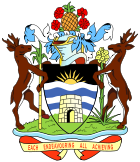
Back برلمان أنتيغوا وباربودا Arabic Parllamentu d'Antigua y Barbuda AST Parlament von Antigua und Barbuda German Κοινοβούλιο της Αντίγκουα και Μπαρμπούντα Greek Parlamento de Antigua y Barbuda Spanish Parlement d'Antigua-et-Barbuda French Անտիգուա և Բարբուդայի խորհրդարան Armenian Parlemen Antigua dan Barbuda ID アンティグア・バーブーダ議会 Japanese Parlament Antigui i Barbudy Polish
Parliament of Antigua and Barbuda | |
|---|---|
| 16th legislature | |
 | |
| Type | |
| Type | |
| Houses | Senate House of Representatives |
| Structure | |
| Seats | 34 members 17 senators 17 representatives |
 | |
Senate political groups |
|
 | |
House of Representatives political groups | Government
|
| Elections | |
| First-past-the-post | |
Last House of Representatives election | 18 January 2023 |
| Meeting place | |
 | |
| Antigua and Barbuda Parliament Building, St. John's | |
| Website | |
| ab | |
 |
|---|
17°07′04″N 61°50′00″W / 17.11778°N 61.83333°WThe Parliament of Antigua and Barbuda consists of the King of Antigua and Barbuda, the Senate and the House of Representatives.
Section 27 of the Constitution establishes the Parliament. Parliament has the authority to enact laws for Antigua and Barbuda's peace, order, and well-being as long as they adhere to the terms of the Constitution. In accordance with the guidelines in section 47, Parliament may amend any clause in the Constitution or the Supreme Court's order. A law that would amend the Constitution or a Supreme Court ruling would not be considered passed by the House unless it received approval from at least two-thirds of all House members at its final reading.[1][2]
No member of either House of Parliament may participate in that House's proceedings (except than those required for the purposes of section 48) unless he has taken the oath of loyalty before that House and subscribed to it: However, before the members of the Senate or the House, depending on the situation, have taken and signed such an oath, elections for the positions of President, Vice President, Speaker, and Deputy Speaker may still take place. Any person who is a member of the House by virtue of holding the office of Speaker or by virtue of holding or functioning in the office of Attorney-General is referred to as a member of the House in section 48.[1][2]
According to section 51 of the constitution, any issue put to a vote in a House of Parliament must be decided by a majority of the members present and voting, unless otherwise specified in the Constitution. Except as otherwise specified in this section, the President or other member presiding in the Senate and the Speaker or other person presiding in the House shall have and exercise a casting vote in the event that the votes are evenly divided on any question: With the exception that a Speaker or other member presiding in the House who is an elected member of the House shall have an original vote but no casting vote in the case of the question of the final reading of a bill as is referenced in section 47(2) of the Constitution. If the votes on any subject before the House are evenly divided while such a Speaker is in office, the motion will be defeated. A Speaker who is not an elected member of the House shall have neither an original nor a casting vote.[1][2]
- ^ a b c "Antigua and Barbuda 1981 Constitution - Constitute". www.constituteproject.org. Retrieved 2023-09-09.
 This article incorporates text from this source, which is in the public domain.
This article incorporates text from this source, which is in the public domain.
- ^ a b c http://laws.gov.ag/wp-content/uploads/2018/08/cap-23.pdf
 This article incorporates text from this source, which is in the public domain.
This article incorporates text from this source, which is in the public domain.